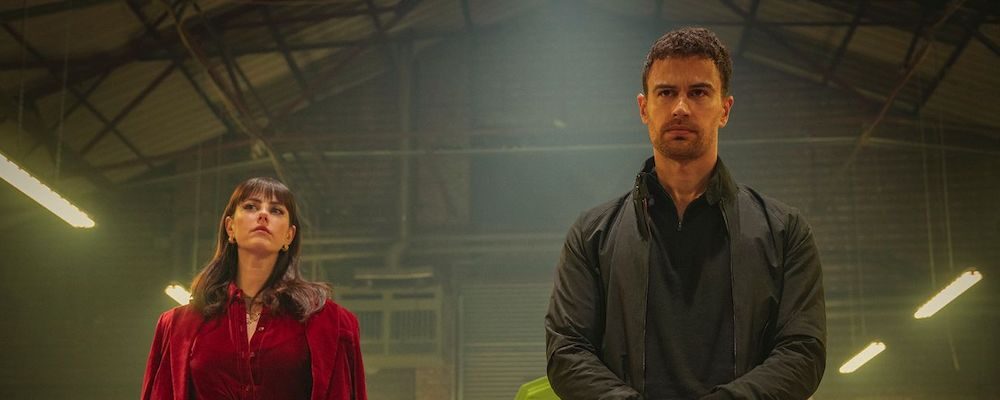Guy Ritchie’s ‘The Gentlemen’ Colorfully Entertains With Stylish Goons and Capers
Alci Rengifo
If you’re searching for tips on how to dress well, then look no further than the recent work of director Guy Ritchie. In particular, Ritchie’s crime thrillers have been strutting like ready-made ads for major clothing lines. It forms part of how his films, with only two recent exceptions, have become all about their look and texture. Ritchie’s Netflix series “The Gentlemen” takes its name from his 2019 movie of the same name. It’s also set in the same world as the film but Ritchie isn’t out to remake the story. To his credit, this is a new plot with fresh characters still inhabiting a terrain of quirky criminals. In some ways, it’s a superior work, with a narrative that’s easier to follow. What remains the same is that it’s all style over substance.
Theo James plays Eddie Horniman, an English army captain posted at the Turkish border with Syria. He receives a call informing him his father is fatally ill. Eddie rushes to his family’s grand estate in the U.K. to say goodbye. But after the patriarch passes away, Eddie is stunned to learn he’s been made inheritor of the estate. This comes as a shock to Freddy (Daniel Ings), the older immature brother who does too much coke. There’s also Eddie’s mother, Lady Sabrina (Joely Richardson), and younger sister, Charly (Jasmine Blackborow). As he tries to adjust to now being a Duke, Eddie is surprised to discover that beneath the family’s 15,000 acres there’s a secret cannabis farm. Apparently, dad used to let a man named Bobby Glass (Ray Winstone), currently in prison, run a marijuana empire managed by his daughter, Susie (Kaya Scodelario). Eddie is fine honoring the deal but soon enough, he needs Susie’s help when Freddy reveals he owes eight million pounds to some brutal gangsters.
Unlike other major directors who get into streaming, Ritchie doesn’t get too self-indulgent with “The Gentlemen.” Episodes build a brisk rhythm driven by the crackling performances and oddball dialogue. With recent movies like “Wrath of Man” and “The Covenant,” Ritchie has successfully explored edgier, darker territory. This show is like a return to some of his basics. Bloody violence is blended with sensuous dinner parties where the chatter revolves around the quality of a watch. The casting is meticulously designed to also be as stylish as the decor. Giancarlo Esposito is total, malicious classiness as Stanley Johnston, an American billionaire obsessed with buying Eddie’s estate. Esposito brings back the smooth-talking demeanor of his kingpin from “Breaking Bad,” now tailored for Ritchie’s brand of zany dialogue. Ray Winstone also looks at ease sitting in a “prison” that’s more of a criminal spa surrounded by woods and snow. Theo James at the center looks born for the Ritchieverse with his chiseled look in preppie sweaters.
Aficionados of Ritchie’s work will bask in how the series is an extended serving of the kinds of colorful settings he first became known for with “Lock, Stock and Two Smoking Barrels.” You don’t just get gangsters in a Ritchie production. You get mad ones with nicknames like The Gospel. You can’t trust anyone, especially if they’re dressed in gorgeous suits. The drug lord Freddy owes money to is willing to forgive him for half the original amount, and if he’s willing to put on a chicken costume and humiliate himself on camera. Freddy goes through with it before the whole scene turns into a bloody mess fueled by cocaine. An ensuing death throws Eddie and Susie into an even bigger, more dangerous dilemma they need to resolve for the rest of the season. Christopher Benstead, who has provided rich scores for Ritchie’s good and bad, underlines the story with an elegant soundtrack.
The trick Ritchie usually pulls off is that he’s not reinventing the wheel here. Most of what happens is familiar to anyone who’s watched more than one crime series. It’s all about how Ritchie films misty English estates or lights the underground cannabis operation in neon. It’s about how absurdly funny a scene becomes when Eddie and Freddy try to convince dangerous drug runners that everything is ok, or when a priest demands a confession and someone blurts out about the accidental killing of a pet years ago. Aesthetically “The Gentlemen” looks like what we expect from the director, but his style is rarely allowed to blossom on TV. So it’s fun to see his brand of title overlays or colorful subtitles splash across the screen. Then there are the little details, as when Johnston instructs a minion on what kind of fountain pen to use for filling out a party invite. Every face looks well-chosen, from rough criminals to high society snobs.
While many major directors have been getting into the game of streaming shows, it’s actually quite surprising how few have been able to master the format. One can compare the challenge to the difference between writing a novel and putting together a collection of short stories. Not all great authors have been masters at both. Ritchie’s style is suitable for TV because at times his films feel like one aspect cancels the other out. In the original “Gentlemen” movie, the plot became almost incomprehensible while the cast, look and soundtrack crackled. As a series, each episode has enough time to be funny while advancing the still ludicrous plot. We buy it because of the energy and panache. It may not turn out to be essential viewing, but it’s not a bad, rather classy option for a lively distraction.
“The Gentlemen” season one begins streaming March 7 on Netflix.

